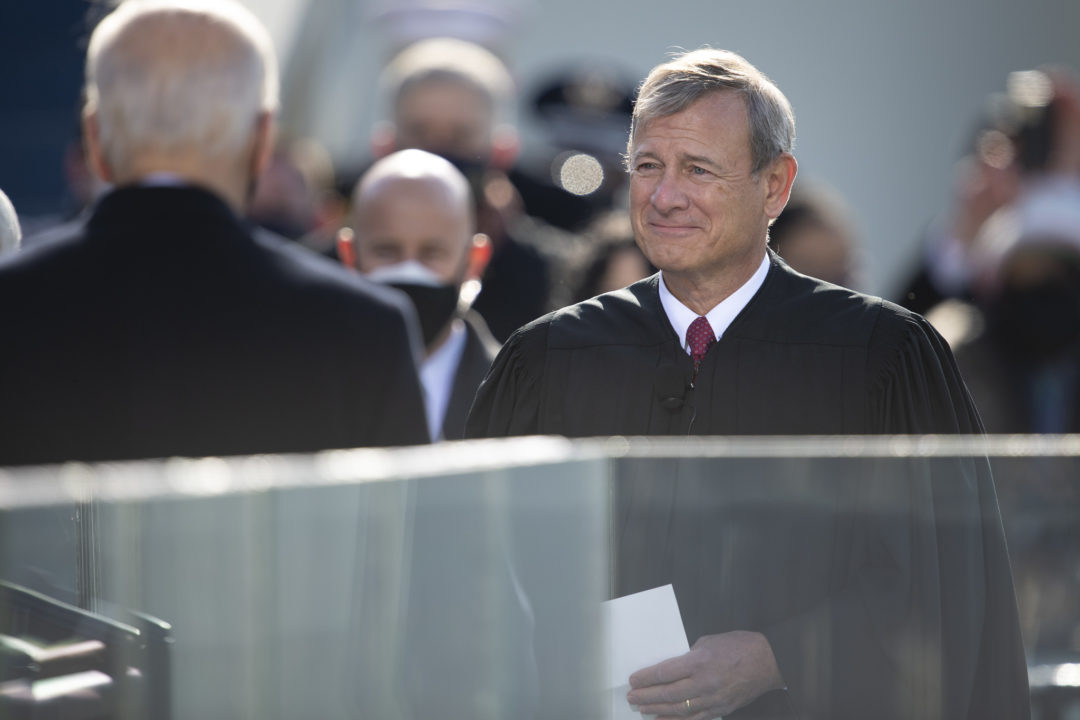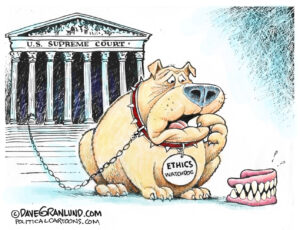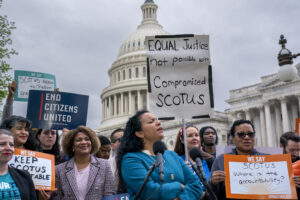Chief Justice Roberts’ Annual Report on the Federal Judiciary Is a Study in Hypocrisy
A Supreme Court ritual ignores a crisis of legitimacy. Chief Justice John G. Roberts Jr. swears President Joe Biden into office during the 59th Presidential Inauguration ceremony in Washington, Jan. 20, 2021. Photo: Navy Petty Officer 1st Class Carlos M. Vazquez II / CC BY 2.0
This is Part of the "The Supreme Court’s War on the Future" Dig series
Chief Justice John G. Roberts Jr. swears President Joe Biden into office during the 59th Presidential Inauguration ceremony in Washington, Jan. 20, 2021. Photo: Navy Petty Officer 1st Class Carlos M. Vazquez II / CC BY 2.0
This is Part of the "The Supreme Court’s War on the Future" Dig series
On Dec. 31, 2022, John Roberts, the chief justice of the United States Supreme Court, released his annual report on the state of the federal judiciary. The report is a yearly ritual in which the head of the high tribunal provides a statistical summary of the number of cases filed in the federal courts during the previous 12 months, and in which the chief typically extols the virtues of the men and women who staff the third branch of our national government.
This year’s report, however, made no mention of the court’s current crisis of legitimacy, which was greatly aggravated by its decision last term rescinding the federal constitutional right to abortion. Nor did Roberts discuss the urgent need for the court to adopt a code of ethics to prevent the justices from engaging in rampant conflicts of interest, such as those involving Justice Clarence Thomas and his right-wing activist spouse Ginni Thomas.
In this year’s statement, Roberts instead praised Congress for enacting the Supreme Court Police Parity Act of 2022, which provides the families of Supreme Court justices with the same level of protection given to federal lawmakers, White House officials and the justices themselves. The act was signed into law by President Biden after an armed man was arrested outside of Justice Brett Kavanaugh’s home in Maryland, and was subsequently charged with attempted kidnapping and attempted murder.
“The law requires every judge to swear an oath to perform his or her work without fear or favor, but we must support judges by ensuring their safety…,” Roberts wrote. “A judicial system cannot and should not live in fear.”
Roberts also used the report to praise the service of U.S. District Judge Ronald N. Davies, who in 1957 was assigned to hear litigation calling for the implementation, in Little Rock, Arkansas, of the Supreme Court’s landmark Brown v. Board of Education ruling that required the desegregation of public schools. “Judge Davies was physically threatened for following the law,” Roberts noted. “His wife feared for his safety. The judge was uncowed, and happily so were others who stuck up for the rule of law.”
Also missing from the annual report was any mention of Roberts’ role in dismantling U.S. civil rights law with his majority opinion in Shelby County v. Holder (2013), which gutted the Voting Rights Act.
You can read the full annual report here.
Your support matters…Independent journalism is under threat and overshadowed by heavily funded mainstream media.
You can help level the playing field. Become a member.
Your tax-deductible contribution keeps us digging beneath the headlines to give you thought-provoking, investigative reporting and analysis that unearths what's really happening- without compromise.
Give today to support our courageous, independent journalists.






You need to be a supporter to comment.
There are currently no responses to this article.
Be the first to respond.